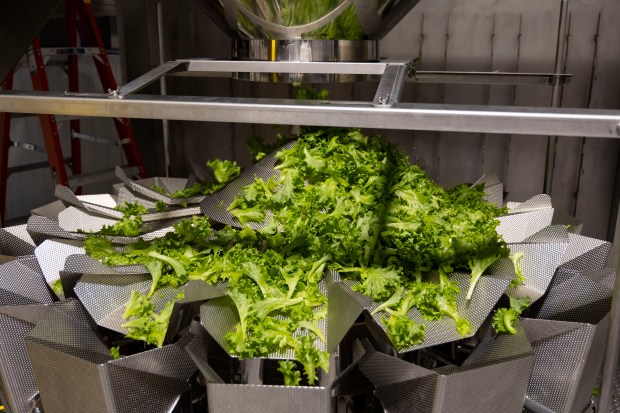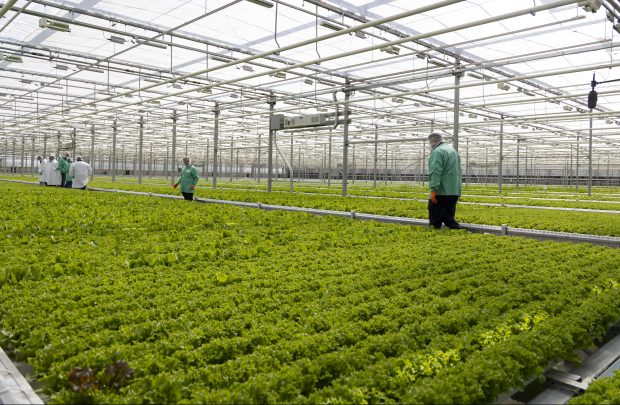Hydroponic grower BrightFarms has opened a new greenhouse in Yorkville, about 50 miles outside Chicago, as part of a nationwide expansion it says will eventually increase its growing capacity seven times over.
The greenhouse is the second in Illinois for BrightFarms, which grows leafy greens sold in grocery stores including Mariano’s and Jewel-Osco.
BrightFarms, which is headquartered outside New York City in Westchester County, opened a greenhouse in Rochelle, about 80 miles west of Chicago, in 2016. The company has five other existing greenhouses, one each in New Hampshire, Virginia, North Carolina, Pennsylvania and Ohio.
The company also plans to open indoor farms in Macon, Georgia and Lorena, Texas, with construction of those greenhouses set to near completion by the end of the year. Because they are larger and more technologically advanced than its existing indoor farms, BrightFarms says, the three new greenhouses will increase the company’s growing capacity by seven times.
The Rochelle farm, for instance, can produce about 4 million salads a year, the company says. The Yorkville farm will produce as many as 25 million. All together, the company says, it will eventually be able to produce as many as 150 million pounds of leafy greens per year.
The increased efficiency of the new greenhouses, CEO Steve Platt said, comes primarily from two areas: a climate control system that keeps the greenhouse at optimal growing temperature year-round and an automated planting system.
“No hands touch anything from seed all the way to harvest,” Platt said. “It’s really advanced compared to what we started with over 10 years ago.”
BrightFarms, founded in 2011, was bought by privately held conglomerate Cox Enterprises in 2021. Subsidiary Cox Farms also owns greenhouse fruit and vegetable grower Mucci Farms.
In the past, BrightFarms dabbled in vegetables — it grew tomatoes at the Rochelle facility, for instance — but has since narrowed its focus to leafy greens. The company also used to strike exclusive deals with grocery stores to build out its greenhouses; it’s moved away from that model too.
“When the company was starting, I think they needed something like that,” Platt said. “But now, we’ve proven the business model, we’ve proven the partnership with our customers.”
The company has netted dollar sales of nearly $60 million over the last year, marking growth of about 20%, Platt said.
Overall, the packaged salad market saw more than $9 billion in sales over the last year, according to market research firm SPINS. Though growth in the industry as a whole remained more or less flat, sales of packaged salads grown in controlled environments — which includes various types of indoor farming including hydroponics — grew more than 30% over the year.
Proponents of indoor growing tout its climate benefits, noting that produce grown locally in greenhouses needs to be driven much shorter distances to grocery shelves than produce grown, for instance, in California and shipped to grocery stores throughout the Midwest. In the Midwest, Platt said, BrightFarms tries not to truck its greens more than four hours away from where they’re grown.
Some advocates have raised concerns about the energy usage required for indoor farming, and research about the overall climate impact of greenhouse farming is mixed.

One study cited in an overview by The Washington Post found that indoor-grown tomatoes had carbon footprints six times larger than their traditionally grown counterparts, while another paper found greenhouse-grown lettuce had lower carbon impacts than lettuce grown outdoors, precisely because of the decrease in trucking miles.
The Yorkville warehouse is located in the Upper Illinois River Valley Development Authority and BrightFarms received sales tax exemptions for building materials, the company said.
The warehouse will gradually ramp up growing capacity, starting with about 70 workers and working its way up to 250 once it begins operating at full capacity. Wages start at $21 an hour.



